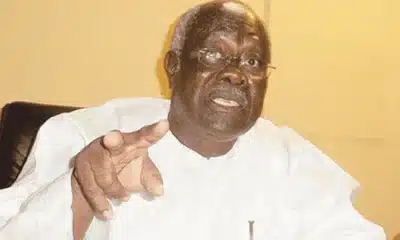Nigeria News
Court Rules On Suit Seeking To Revoke Hannatu Musawa’s Appointment As Minister

The appointment of Hannatu Musawa as Minister of Art, Culture and Creative Economy by President Bola Tinubu has been upheld by the Federal High Court in Abuja.
In a judgment delivered by Justice James Omotosho, it was determined that the plaintiffs lacked the legal right to sue in court.
According to the court, even if the plaintiffs had the standing to file the case, it was found to be without merit.
Naija News recalls that President Tinubu had nominated Musawa, along with other minister-designates, for confirmation by the Senate on July 27, 2023.
Following her screening on August 1, 2023, Musawa was subsequently sworn in as minister on August 21, 2023.
When the minister, originally from Katsina State, was appointed, there were allegations that she was a serving member of the National Youth Service Corps (NYSC).
In light of this situation, the Incorporated Trustees of Concerned Nigeria, along with Chief Dr. Patrick Eholor and Thomas Marcus as the 1st to 3rd plaintiffs, respectively, brought the case before Justice Omotosho.
The case, with reference number FHC/ABJ/CS/1198/23 filed on August 30, 2023, named President Tinubu, the Attorney-General of the Federation (AGF), and Musawa as the 1st to 3rd defendants, respectively.
They requested the court to determine whether, according to Section 2(1) and (3) of the NYSC Act and Section 4(9) of the NYSC Bye-Laws (Revised 2011), Musawa, who was a corps member at the time, was prohibited from becoming a federal minister.
The plaintiffs have also requested the court to determine whether the qualifications for a member of the House of Representatives are the same as those required for the appointment of the 3rd defendant (Musawa) as a minister, as stated in the provisions of the 1999 Constitution (as amended). They have further emphasized the necessity of these qualifications for her to hold the position of a federal minister in Nigeria.
Upon a favourable resolution of these questions, the plaintiffs have sought an order to nullify the initial recommendation, resolution, appointment, and swearing-in of Musawa as a minister. Additionally, they have requested an order to set aside the swearing-in of the minister.
Furthermore, they have requested a mandatory injunction to invalidate any official actions carried out by her in any official capacity from the moment of her swearing-in as a minister until the final conclusion of the lawsuit.
The plaintiffs have prayed for the court to issue an order for the payment of general damages amounting to N100 million against all the defendants.
In their sworn statement, they contended that Musawa’s appointment as a minister to oversee the Ministry of Culture was mistakenly scrutinized by the Senate.
However, the 1st and 2nd defendants, in a joint preliminary objection filed on February 15, requested the dismissal of the lawsuit due to lack of jurisdiction.
They asserted that Musawa’s appointment was carried out in accordance with existing laws, as she was duly nominated, screened by the Senate, and appointed by the president.
According to their argument, there is no legal impediment preventing the 1st defendant from appointing an individual who is still serving as a member of the NYSC as a minister.
Furthermore, they contended that the only requirement is the same as that of a person running for the position of a member of the House of Representatives.
They maintained that possessing an NYSC certificate or completing the NYSC program is not among the fundamental prerequisites for ministerial appointment. They urged the court to dismiss the lawsuit on the grounds that the plaintiffs lacked the competence to initiate this legal action.
On the other hand, Musawa’s lawyer argued that the 1st plaintiff does not exist as a legal entity and therefore lacks the capacity to bring forth this lawsuit.
Additionally, they contended that none of the plaintiffs have demonstrated how they have suffered a unique injury that would qualify them, to the exclusion of all other Nigerians, to pursue this lawsuit.
In the judgment delivered on Tuesday by Justice Omotosho and the certified true copy of it sighted on Thursday, the judge agreed that for a person to be qualified for appointment as a minister, he must fulfil the conditions in Section 147 (5) of the 1999 Constitution.
According to him, Section 147 (5) says no person shall be appointed as a minister of the Government of the Federation unless he is qualified for election as a member of the House of Representatives.
“It is clear from the above that the qualification for being a member of the House of Representatives will guide the qualification for being a minister of the Federal Republic of Nigeria,” he said.
According to the judge, in accordance with Section 65 and subject to Section 66, an individual must meet certain criteria to be eligible for election as a member of the House of Representatives.
These criteria include being a citizen of Nigeria and being at least 30 years old. Additionally, the judge emphasized that under Subsection (1) of this section, a person can also qualify for election if they have received education up to the level of a school certificate or its equivalent.
Furthermore, they must be a member of a political party and be sponsored by that party.
“The constitution has made it crystal clear the qualifications and grounds for disqualification as a minister and being a serving corp member is not one of such grounds.
“In fact, a person who wants to be appointed a minister only needs to show that he has been educated up to secondary school level.
“Thus, the National Youth Service Corps Certificate, which can only be attained by graduates who have completed the scheme, is a supplement to the basic requirements to be a minister.
“I therefore hold that nothing stops the first defendant (Tinubu) from appointing the third defendant (Musawa) as a minister, as she is eminently qualified to do so.
“In final analysis, the plaintiffs lack locus standi to institute this action.
“Even where they are vested with locus standi, the suit lacks merit — same is hereby dismissed,” Justice Omotosho declared.












